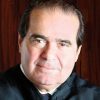The government’s ability to enforce generally applicable prohibitions of socially harmful conduct, like its ability to carry out other aspects of public policy, “cannot depend on measuring the effects of a governmental action on a religious objector’s spiritual development.” To make an individual’s obligation to obey such a law contingent upon the law’s coincidence with his religious beliefs, except where the State’s interest is “compelling” — permitting him, by virtue of his beliefs, “to become a law unto himself” — contradicts both constitutional tradition and common sense.
Antonin Scalia (1936-2016) US Supreme Court justice
Employment Division v. Smith, 494 U.S. 872, majority opinion (1990)
(Source)
Opinion holding that the state could prohibit religious-based peyote use.

